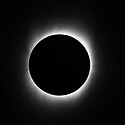There will be 224 solar eclipses in the 21st century, of which 77 will be partial, 72 will be annular, 68 will be total, and 7 will be hybrids between total and annular eclipses. Of these, two annular and one total eclipse will be off-centre, in the sense that the path of the maximum eclipse will only touch Earth's surface rather than traversing it. The greatest number of solar eclipses in one year will be four, in 2011, 2029, 2047, 2065, 2076, and 2094. So far, the longest duration in which the moon totally covered the sun, known as totality, was during the solar eclipse of July 22, 2009 (pictured). This total solar eclipse had a maximum duration of 6 minutes and 39 seconds. The longest possible duration of a total solar eclipse is 7 minutes and 32 seconds. The longest annular eclipse was on January 15, 2010, with a duration of 11 minutes and 8 seconds. The possible maximum duration is 12 minutes and 29 seconds. The eclipse of May 20, 2050 will be the second hybrid eclipse in the span of less than one year, the first one being on November 25, 2049. (Full list...)
